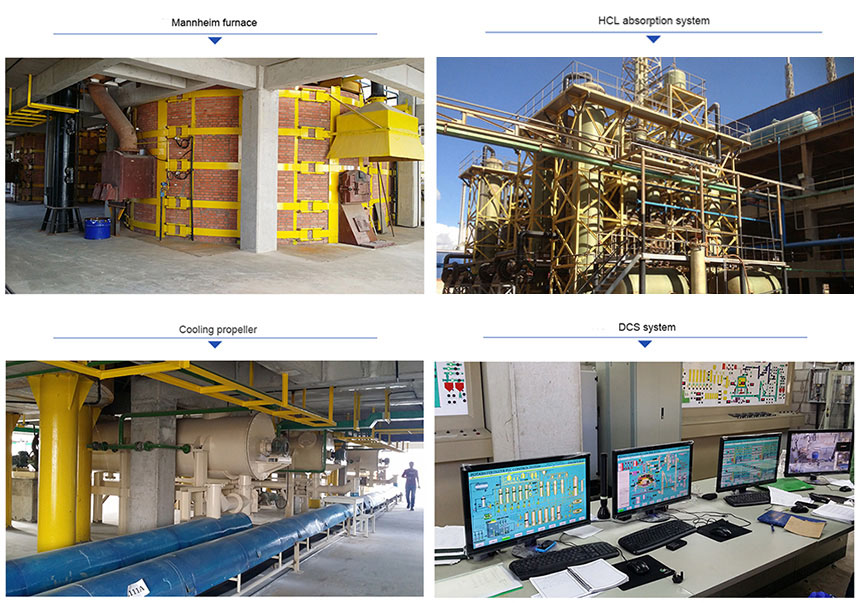5 uses of potassium sulfate in everyday life - Formulation - Applications - Solubility
As living beings, we forget the fact that we cannot survive without chemistry. What we eat, what we wear, and even what we throw away contains compounds that we don't know about and we ignore it. Or simply because we don't know exactly what these compounds are good for us. Here is some explanation of potassium sulfate, one of the compounds we may encounter in our daily lives, but if we knew how to use it, we wouldn't know how useful this compound is.
What is potassium sulfate?
Potassium sulfate (K 2 SO 4 ) is a compound made from a combination of potassium (K), sulfur (S) and oxygen (O). It was first discovered in the early 14th century. Scientists first began naming it after the name arcanuni, based on the fact that its materials are acid and base salts. Potassium sulfate comes in white crystals. It is hard and colorless, and also has a salty and bitter taste. It is non-flammable and soluble in water but insoluble in alcohol. Potassium sulfate contains a large number of rare minerals such as kainite, carnallite, leonite, rambetite, mannite, and miscellaneous halite. Most uses of potassium sulfate are to help fertilize soils and repair damaged tissues.
Potassium sulfate cannot be found naturally from the earth and should be processed first. In the past, scientists made potassium sulfate by reacting potassium chloride with sulfuric acid, but it turned out to be not pure enough because it still contained chlorides that were harmful to plants. Later scientists discovered a way to produce this compound that would bring out a purer and natural potassium sulfate.
The most popular and used method nowadays is to produce potassium sulfate by manipulating several earth minerals. Because a good material for potassium is mined deep in the earth can also be one of the options. The production of good and pure potassium sulfate starts with the dissolution of water and salt to remove by-products.
Indeed, here are all the uses of potassium sulfate in everyday life for compounding many fields.

Potassium Sulphate Equipment with Mannheim Furnace
1. Industrial
Potassium sulfate is used in the industrial sector in everyday life. The rapid demand for potassium sulphate is not only growing in the agricultural sector. In the industrial sector, potassium sulfate is used to reduce muzzle flash, kickback and blast overpressure in artillery propellants. It can be used to reduce aftereffects and also as barrel protection. In artillery manufacturing, potassium sulfate is used specifically to propel the powder in the cartridge cage.
This propellant has been invented since the beginning of artillery development and is now used mainly in semi-automatic and fully automatic guns. In the bullet cage, potassium sulfate is used as a material to make propulsion powder in order to reduce flash, so that a smokeless effect is produced when the bullet is fired. The use of potassium sulfate with other elements can also be used as a booster.
Potassium sulfate can be mixed with aluminum fluoride, aluminum fluoride hydrate, chromium fluoride, vanadium pentoxide and other substances to atomize the propellant powder while it burns to produce a good effect. But care should be taken when mixing these substances because without the proper amount, it can have the opposite effect.
Another role is that potassium sulfate is commonly used in soda blasting, replacing soda as a blasting medium because of its identical structure and properties. Soda blasting is commonly used to remove paint and rust without damaging materials such as metal, glass, chrome and thin sheet metal. Although this soda blasting shows an effective method and a gentler process, potassium sulfate can provide the same benefits as soda blasting, but with greater efficiency and speed, without leaving any traces of the Supreme Soda Blast used as a blasting medium.
Potassium sulfate produced from plants and wood ash is used as a raw material for soap and glass making. Potassium makes glass hard and heat resistant, and the salt contained in the potassium used in soap can help repair damaged skin. However, considering that the use of potassium sulfate is more expensive, manufacturers prefer other alternatives, even if the residue produced by the use of this potassium sulfate can be used for other purposes in the future.
2. Agriculture
Potassium sulfate is considered a good substance for the earth, which means that it will enrich the soil. It contains the nutrients needed for healthy plant growth, meaning that it provides the balanced nutrition that plants need. Adequate amounts of potassium sulfate help plants grow better, have better quality fruit, and increase resistance to pests and diseases.
Potassium sulfate has a pH of 7, so it contains a stable pH that is good for the soil and plants, unlike chloride which can kill and waste some useful microorganisms. Potassium sulfate stimulates photosynthetic systems, such as helping to stimulate enzymes to process proteins, regulate water through cells and leaves, and produce sugars and starches. Potassium sulfate residues used in the soil are transported through irrigation, into rivers and eventually into seawater, buried deeper and deposited as salt, and ultimately these elements are not wasted, it is recycled.
The primary and essential function of potassium sulfate is to be used to advantage in agriculture. One of the most useful things made from potassium sulfate is compost. The substances contained in potassium sulfate help increase yields. If farmers use potassium sulfate in their produce, the result can be seen as an improvement in the color, texture and taste of the fruit.
Even now there are many organic composts that contain potassium sulfate, which will help support farmers of organic vegetables and fruits. The application of potassium sulphate is superior to other materials because the requirements are very suitable and do not have any harmful effects on the plants.
3. Pharmacy
Potassium sulfate is mainly used for the preparation of adults before colonoscopy. Mixed with magnesium and sodium, potassium sulfate is commonly used to cleanse the intestines. In medicine this mixture is mainly used as a laxative because it acts to increase the amount of water in the intestines, making it easier for the intestines to move to cleanse all the The contents are in their stomach.
The drug should be taken first mixed with water and never without water, as it can cause vomiting, nausea and loss of electrolytes in the blood. Since the side effects of this compound can cause significant fluid loss and electrolyte imbalance in the body, patients taking this drug are advised to take plenty of water to replenish these fluids.
Patients taking these medications are also advised to take small amounts for breakfast and not to eat any heavy foods that will bring about the most effective effects of the medication. This medicine is not suitable for the elderly as they are more sensitive to its effects, especially vomiting. The drug can also be avoided for those who are pregnant or intend to become pregnant.
The drug has been approved as safe by many health agencies, so as long as you have a prescription from your doctor you do not have to worry about the effects. Other functions of potassium sulfate as a medication are to provide potassium in the blood and to repair muscle tissue. This will help in the proper distribution of potassium through the veins. It can also be used as a diuretic treatment for high blood pressure. If you take this medication, try to avoid drinking alcohol or breastfeeding.

Application of Potassium Sulphate Equipment
4. Animals
Like humans, the animal body also needs potassium to keep the body systems in balance. In animals, potassium is the third most abundant mineral after calcium and phosphorus. Potassium deficiency in young animals due to the effects of their diet can cause them to underdevelop and die. Potassium deficiency can be seen as the animal becomes weak, muscle growth is slow, food intake is reduced, and heart rate is lowered.
Adequate amounts of potassium help maintain acid-base balance, maintain osmolarity, maintain osmotic pressure, activate enzymes, metabolize carbohydrates and proteins, regulate neuromuscular activity, regulate heart rate and finally balance water in the animal's Body. Sulfur is used as an element for the production of the amino acids methionine and cystine, which produce proteins.
Potassium sulfate is used as one of the nutritional products to treat malnutrition. Potassium sulfate is commonly used as a food supplement, and most animals that feed on potassium sulfate become larger and healthier. Potassium sulfate can also be used to help improve the reproductive system. It is mainly used in beef and poultry, especially chicken and turkey.
The best time to give this supplement is the first 8 weeks, when heat stress increases. At that moment, mortality will decrease, body weight will increase and feed intake will improve. In the case of laying hens, the right amount of potassium will affect the quality of the eggs, the amount of potassium will increase, as will the egg weight and the thickness of the shell.
Potassium sulfate can be found in grasses used in the animal food supply. However, due to the low amount of potassium sulfate in nature and due to its soluble properties, it can be fertilized by adding potassium sulfate to the solution.
Scientists say that potassium sulfate is one of the most abundant materials on earth, one of the most reactive, and has more positive electrolytes than other materials. This is because basically you can find potassium anywhere, including the soil itself, but in smaller amounts, and the potassium in the soil is sometimes impure, with some elements mixed in, such as magnesium, sodium and chloride.
5. Food
In this modern era of increasing demand for quality, healthy and safe food, one of the solutions is the number of products today that use potassium sulfate as one of their ingredients. Potassium sulfate is labeled as a safe and non-toxic compound by scientists and many public health organizations, making producers and consumers alike dependent on this compound to keep their bodies healthy. One of the uses of potassium is as a water purifier.
Easily soluble in water, potassium sulfate can carry away harmful substances such as microorganisms or contaminants that can affect the taste, odor and safety of water. In beverage manufacturing, potassium sulfate can be added as an ingredient in soda drinks.
One of the most important elements our bodies need is minerals. Potassium is one of the important minerals that help circulate the blood supply and maintain the body's development and growth. We may not realize the great function potassium can give us, but this potassium can help maintain acid-base balance in the body, balance the amount of water, keep the body going by helping to build muscles, transmit nerve impulses, and the proper function of our enzyme system.
Not only that, but new research has found that potassium and sulfates can be used for those who want to go on a non-protein diet. This is because they help build muscle, keep the heart functioning, and also balance electrolytes in our bodies. Potassium deficiency can lead to cirrhosis, diarrhea, vomiting, diabetic acidosis, body burns and severe protein-calorie malnutrition. It occurs because most of the diets they take lead to carbohydrate deficiency resulting in lower potassium levels.
Therefore, a diet using potassium sulfate can be an alternative for people who want to diet without worrying about their health. But the amount of sulfate that can enter our body should be sufficient, otherwise we should be ready to take risks. Many problems, mainly related to our digestive system, such as bleeding in the gastrointestinal tract or even kidney stones, can occur due to an excess of sulfate. If you want to eat this diet, you can find it in spinach, carrots, potatoes, oranges, grapes and blackberries. In fact, potassium sulfate has many uses in everyday life.
Our company can provide the whole set potassium sulfate production equipment,we can provide the service from design,manufacturer to installation and We can provide the service from design, manufacturer to installation and commissioning, the process is Mannheim furnace.





